Each student is different, and we work hard to provide a supportive community environment in which all can flourish and reach their potential.

Students in the international stream follow a programme based on the English National Curriculum and enhanced for our international setting. Because we believe that students should appreciate and understand their surroundings.
Students are taught in English and are required to study French.
We support students on their journey from kindergarten to secondary school. We are there for them every step of the way, from when they first learn to write, all the way through to their IGCSE and IBDP exams. We also help all our students apply to and prepare for studying at top universities worldwide.
Students learn to be effective and tenacious class communicators and collaborators, expressing their creativity and self-confidence. We equip them with skills and attributes that will take them far in life. This philosophy is encapsulated in our IPROMISE Personal Profile. We also aim to ensure students enjoy the learning experience and receive an excellent, well-rounded education, enabling them to excel in their chosen careers. And we are always proud to see the young adults they become.
Each student is different, and we work hard to provide a supportive community environment in which all can flourish and reach their potential.
 One multicultural school for your child’s entire education
One multicultural school for your child’s entire educationThe French International School is innovative in spirit. We are the only school in Hong Kong to offer the IEYC, IPC, IGCSE and IBDP curricula. We were one of the first international schools in Hong Kong some 55 years ago. And, around 20 years later, we became the first school in the region to receive International Baccalaureate accreditation. We accompany students throughout their school journey, from Nursery (ages 3 – 4) to Year 13 (ages 17 – 18) and up to their entry to university. We are global in community and outlook. Our 2,700 students hail from over 40 different countries and by the time they leave, the majority have mastered two languages, with some proficient in three or four.
 Student wellbeing
Student wellbeing The wellbeing of our students is a priority. During their time with us, they benefit from lots of personal attention from their teachers, as well as access to support from counsellors and external organisations.
 Academic excellence
Academic excellence We aim to ensure that all our students perform at their best. For many, this means gaining entry to Russell Group and Ivy League universities. But at FIS, it also means pursuing careers in diverse fields, such as fashion, photography and art.
 A modern approach to teaching
A modern approach to teachingWe adopt a modern approach to teaching, using assessments of learning outcomes, neuroscience and harnessing student motivation to help each student do their best.
 You do not need to be French to join the international stream and benefit from a French experience
You do not need to be French to join the international stream and benefit from a French experienceNeither you nor your child need to be French or speak French to join us. Classes are taught in English, while French as a foreign language (FLE) is gradually incorporated into your child’s curriculum. International stream students share campuses with students from the French stream, which helps to create a cohesive school community. The various activities on offer also give them the opportunity to learn from and mix with students from across our diverse community, providing cultural enrichment and improving their French language skills.
Students follow the International Early Years Curriculum (IEYC), made up of units of learning which establish the foundations of the essential skills, knowledge and understanding they will need as they progress through school. Each IEYC unit begins with an exciting Entry Point and ends with an Exit Point where parents are invited to take part in the learning journey. In addition to numeracy and literacy, FIS students question the world around them and are exposed to a wide range of sports and arts. Students are taught in English.
During these early years, we provide a holistic education based on the English National Curriculum and adapted to suit our international setting. Students learn about the world around them and gain an understanding of their role as members of a global community who will lead happy, healthy and rewarding lives.
A big part of the IEYC curriculum (for Nursery and Reception) is play-led learning. Teachers for these year groups at TKO and JL campuses work together to continually develop the curriculum. For us, play is a universal language that supports the holistic development of every child. It is innate, enjoyable and unique, with endless possibilities. At international stream primary, every child has the right to explore, express themselves and learn through play.
We encourage students to ask questions and develop their curiosity about the world. By working both alone and in groups, they learn to be independent, creative and considerate.
Through an active learning approach, our students develop empathy and resilience alongside the skills of teamwork, leadership and communication. These fundamental skills and attributes will not only equip them for the demands of secondary education but also for life itself. Ross Armitage, Head of Primary, International Stream
We follow the English National Curriculum for both English and Mathematics, ensuring that each subject is taught separately throughout the early years. We use the following programmes to support teaching and learning in these subject areas:
Wordsmith is a fully integrated programme for reading comprehension, speaking and listening, grammar and writing, designed to help every child progress. Wordsmith provides a consistent approach to teaching English with detailed plans. Students learn to express themselves creatively and imaginatively as they become enthusiastic and critical readers of stories, poetry and drama, as well as of non-fiction and media. They gain an understanding of how language works by looking at its patterns, structures and origins.
Abacus is a unique maths toolkit that is carefully crafted to support the teaching and mastery of mathematical concepts. It provides in-class and home learning support through interactive online activities, practical application and written support work. As students move through kindergarten, they will be able to confidently solve problems, reason mathematically and successfully carry out investigations by drawing upon the mathematical experiences and knowledge gained through a rich, broad and exciting mathematics curriculum.
The IEYC uses international best practices, holistic enquiry and play-based approaches that cover all curriculum areas.
Children’s development is supported through four learning strands: Independence and Interdependence, Communicating, Enquiring, and Physical Health and Well-Being.
The IEYC also develops international mindedness and personal growth.
Every year group works on diverse, carefully selected units throughout the school year.
Some of the themes your child could be learning about in early years include:
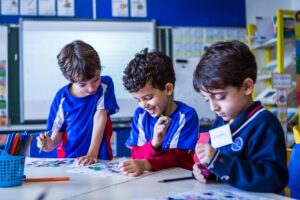
We learn and play together, supporting one another as we explore and experience new things every day. We have lots in common, but there are also lots of things about ourselves that make us special. Together, we are going to learn about ourselves and each other and celebrate what we have learned with our families.
Students follow the International Primary Curriculum (IPC), made up of units of learning which establish the foundations of the essential skills, knowledge and understanding they will require as they progress through school. Each IPC unit begins with an exciting Entry Point and ends with an Exit Point where parents are invited to take part in the learning journey. In addition to numeracy and literacy, FIS students question the world around them and are exposed to a wide range of sports and arts. Students are taught in English.
Our goal is for every student to develop a love of learning and gain the skills, knowledge and understanding needed to be confident learners and successfully progress to the next level of education.
Teachers from each year group work closely together to ensure that each class has a similar learning experience. A lot of work is done verbally, concentrating on higher order thinking skills. In line with the International Primary Curriculum, we use a mixture of teaching approaches, working both as whole class groups and individually. We adopt a cross-curricular approach between subject areas. Building on the foundations laid in Nursery, we continue to instil in students a love of learning while guiding them through the more challenging topics and concepts covered in each learning unit. Learning is the core of all our work. We define learning as the lifelong process of acquiring knowledge, developing skills and making connections in order to understand the world and our place within it.
The positive support of our parents is very important, and we maintain an open and welcoming environment where we can work together for the benefit of our students. Through partnerships with parents and the local community, our curriculum promotes global citizenship and international mindedness. FIS students, parents and staff have worked together to establish a shared definition of international mindedness, which is: being inclusive, respectful, accepting and open-minded about each other’s differences and cultures.
We follow the English National Curriculum for both English and Mathematics, ensuring that each subject is taught separately throughout primary. We use the following programmes to support teaching and learning in these subject areas:
Wordsmith is a fully integrated programme for reading comprehension, speaking and listening, grammar and writing, designed to help every child progress. Wordsmith provides a consistent approach to teaching English with detailed plans. Students learn to express themselves creatively and imaginatively as they become enthusiastic and critical readers of stories, poetry and drama, as well as of non-fiction and media. They gain an understanding of how language works by looking at its patterns, structures and origins.
Abacus is a unique maths toolkit that is carefully crafted to support the teaching and mastery of mathematical concepts. It provides in-class and home learning support through interactive online activities, practical application and written support work. As students move through kindergarten, they will be able to confidently solve problems, reason mathematically and successfully carry out investigations by drawing upon the mathematical experiences and knowledge gained through a rich, broad and exciting mathematics curriculum.
The IPC is a comprehensive, thematic, creative curriculum with a clear process of learning and specific learning goals for every subject. It also develops international mindedness and encourages personal growth.
The transformational curriculum is made up of exciting, engaging and globally relevant thematic units of work covering 10 subjects: Art, Geography, History, ICT & Computing, Music, Physical Education, Science, Technology and International.
Every year group works on diverse, carefully selected units throughout the school year.
Some of the themes your child could be learning about at primary level include:
FREEZE IT
We are going to be looking at water and ice from different viewpoints. As scientists, we will investigate water and what happens if we cool it. Do you know that water is sometimes solid and sometimes a liquid? We will be geographers and explore cold and icy places around the world. Have you been to any cold and icy places? What makes them so cold… and what happens if they warm up?
LIVE AND LET LIVE
In Live and Let Live, we will be learning about living things and what they need in order to survive. How do we know what living things need? How do you know that you are alive, but a stone has never been alive? To find out the answers to these questions, we will need to be scientists, geographers and ecologists.
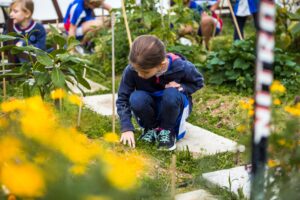
We will be learning about inventions and how they can transform our lives. We will need to be historians and scientists in order to study inventions from the past that have changed our world. Can you think of ways we could use our knowledge to think about current problems and what inventions may be necessary in the future?
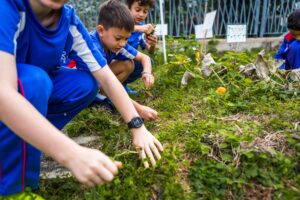
In Different Places, Similar Lives we will be learning about the similarities and differences between how people lead their lives in different countries throughout the world. We will need to be global ambassadors as we compare our school life with another school internationally, geographers as we explore how the climate affects the way people live and historians as we learn about how important people in the countries we are studying have changed lives. Can people have similar interests and lifestyles even if they live in different countries of the world?
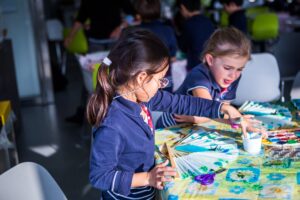
We are going to find out about science by making bread. The processes involved in bread-making can teach us how molecules behave in different materials (solids, liquids and gases) and how these materials can be changed.
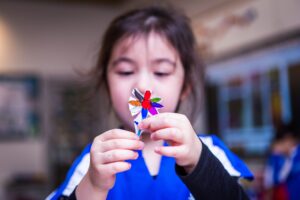
Our brain is special because we can use it to learn lots of new and different things every day, enabling us to gain the knowledge, skills and understanding that we will need to become successful adults. By finding out more about how we learn, and how we can improve the way that we learn, we will be better equipped for meeting the many challenges ahead of us.
In lower secondary, our aim is to provide students with the foundations for academic success and personal growth. Our dedicated and experienced staff work to ensure that students are happy and engaged in this excellent learning environment. We aim to instil in them a love of learning and the importance of self discipline as well as respect for all members of the school and wider community.
Students begin their secondary schooling in Year 7.
Our philosophy at FIS is clear: every student deserves academic rigor and personalised support. We are a community where students with different needs and from all levels of education find both the challenge to grow and the support to belong. Helena Murchie, Head of Secondary, International Stream
Introduced in 2020 to Y7 and gradually implemented in Y9 by Sept. 2022
The Cambridge International IGCSE examinations are offered across 20 or so subjects in Y10 and Y11
Mathematics, English and Science. In Year 9 combined Science splits into the three separate sciences (Chemistry, Physics and Biology) to prepare students for this aspect of the IGCSE curriculum.
History and Geography are taught together in Social Studies lessons. Students will know that the study of geography concerns the interaction of people and their environments, including the economic, social and political factors and how they impact on people and the environment. In History, students know that history concerns events, actions and peoples of past societies and develop an understanding of the relationship between the past and students’ lives today. The increasing complexity around these factors is explored in greater depth as learners move from Milepost 1 to the IMYC.
PSHE (Personal Social Health Education) is held once a week and aims to look after the social and emotional needs of our students, with a strong focus on pastoral care. All students also participate in regular physical education classes, gaining exposure to a variety of sporting disciplines and games.
French is compulsory and beginners to native speakers are accommodated.
Students also choose Mandarin or Spanish. Mandarin lessons are for those who have some previous knowledge up to native speaker level and Spanish is offered to beginners.
We promote as holistic an education as possible. Art, ICT and Computing are taught together in Creative Studies lessons. Drama and Music form an important part of weekly lessons.
The International General Certificate of Secondary Education (IGCSE) is a comprehensive two-year programme for Year 10 and 11 students. It is a universally recognised qualification among international schools and universities worldwide which aims to provide learners with a broad and balanced mix of practical experience and theoretical knowledge.
At FIS, students are required to take four compulsory and five optional examined subjects. Personal, Social and Health Education classes are also compulsory but are not examined. IGCSE options are selected in Year 9.
All IGCSE courses at FIS are assessed by Cambridge International Examinations
All FIS students qualify for the Cambridge ICE award, which recognises learners who pass examinations in at least seven IGCSE subjects from five different subject groups (including two different languages). This prestigious award sets our students apart from others around the globe.
With entry to the top universities increasingly competitive, we want to give our students the skills, knowledge and confidence to improve their chances of being accepted into their first choice university.
So we have introduced the super curriculum, an opportunity for students to enrich their academic studies. It is a flexible hour per week in Year 10 where we help students work on a specific skill or project, such as a personal research project, presentation and public speaking skills, a media literacy course, accessing international competitions or coaching and mentoring younger students.
The focus of these final years is to provide students with a holistic education, with students benefiting from excellent academic teaching and guidance to prepare them for the future.
The school’s unique learning experience culminates in the two-year International Baccalaureate Diploma Programme. We focus on developing a desire to learn through a range of linguistic, cultural and educational experiences and exposure to diverse intellectual, social and global perspectives, which will prepare them well for adulthood.
Students are encouraged to reach their academic potential during these important examination years, as well as continuing to develop the skills and qualities needed for their future career.
The IB Diploma Programme (IBDP) is a comprehensive and challenging two-year course designed to foster a positive attitude to learning. The programme aims to provide learners of different cultures, languages and educational backgrounds with the intellectual, social and global perspectives that are vital for their higher education and career development.
With over 30 years of experience in teaching the IBDP, we offer an enhanced programme including a unique opportunity for proficient English, French and Mandarin speaking students to earn the IB Bilingual Diploma, a prestigious and highly valued qualification which gives our students an advantage when applying to their chosen universities.
During the two-year course, students receive a great deal of support from their subject teachers, guidance from form tutors, the IBDP Coordinator, university counsellors and head teachers through regular meetings both as a group or individually.
Students are required to study six subjects (one subject from each group) with three subjects studied at Higher Level (HL) and three at Standard Level (SL). IBDP options are selected in Year 11.
In addition, the curriculum includes three core requirements that aim to broaden the educational experience and challenge students to apply their knowledge and understanding.
Students can choose from the following IBDP options:
GROUP 1: Language and Literature
GROUP 2: Language acquisition
GROUP 3: Individuals and societies
GROUP 4: Sciences
GROUP 5: Mathematics
GROUP 6: The arts